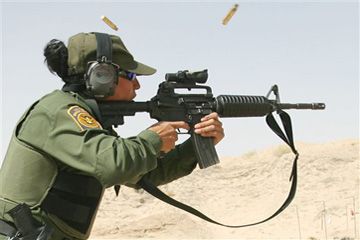By Alicia A. Caldwell, Associated Press
EL PASO — Death threats had become routine for Blanca Angelica Parra, a police officer in Ciudad Juarez until the summer of 1995.
“In Juarez when you arrested someone they would threaten you, they were going to kill you and your family,” Parra said of life as a police officer in the hardscrabble city across the Rio Grande from El Paso. “But normally that didn’t happen.”
 U.S. Border Patrol Agent Blanca Parra demonstrates her marksmanship with an M-4 carbine Thursday May 1, 2008 at the Border Patrol’s firing range in Fabens, Texas. (AP Photo/Victor Calzada) |
Parra believed the violence between drug cartels and police would only worsen, so she quit her job and moved with her daughter to the United States.
She was right. In the intervening 13 years, police have become routine targets of drug traffickers and now Parra’s back in a position to help them as a U.S. Border Patrol agent.
“I always wanted to be a law enforcement officer,” Parra said. “When I came over here, I said ‘one day I’m going to be a Border Patrol agent.’”
From the relative safety of the northern side of the border, Parra has heard of numerous police officers, include several former colleagues, being gunned down. Most recently, the No. 2 cop in the sprawling city was killed in a hail of bullets sprayed at his car outside his house.
“I’m glad that I’m here, in the Border Patrol,” Parra said.
It wasn’t easy for her to get there.
She spent her first several years in the U.S. working her way up from cashier to assistant manager to manager at a Diamond Shamrock gas station in El Paso. She learned English and studied education — just in case the Border Patrol didn’t work out.
Then she became a citizen in 2000.
“That day I went online and applied for the Border Patrol,” Parra said with a grin.
But her law-enforcement experience wasn’t an immediate plus. Because she was with the Ciudad Juarez Police Department, an outfit with more than its share of corruption, Parra’s background check took more than a year and a half.
Now a five-year Border Patrol veteran, Parra is a senior patrol agent, a firearms instructor, and a field training officer in the Border Patrol’s Fort Hancock station east of El Paso.
“You don’t get that unless you a very good shot,” Supervisory Patrol Agent Robert Arnold said of Parra’s instructor status.
Arnold said Parra’s experience dealing with “a lot of bad guys” in Mexico before moving to the U.S. also has proven invaluable.
Many of those “bad guys” were members of the now-warring Juarez drug cartel. Their growing volatility and increasing threats that more than a decade later have come to fruition were among the chief reasons Parra and her daughter, now 19, left.
“It was very unsafe for her,” Parra said of her daughter. “It was one of my reasons for moving.”
Though it might seem unusual to make the leap from a Mexican police department, Arnold said Parra was an instant fit with the agency.
“She’s adapted very well,” Arnold said. “She’s conducted herself well. She’s very well respected.”
Parra said some colleagues initially seemed taken aback by her thick Mexican accent and her Juarez experience.
But Robert Gallardo, the assistant patrol agent in charge of the Border Patrol’s Fort Hancock station, said any doubts were quickly erased.
“She’s got a lot of initiative, a lot of motivation,” Gallardo said. “She’s an excellent agent for us.”
Parra said she’s feels sad, but not guilty, arresting Mexican citizens trying to find the same sort of life she has found in the United States. Her two daughters, two sisters and four brothers are all U.S. citizens now.
“I’m doing my job,” she said. “Sometimes it’s sad when you send them back if they are not criminal or bad people. I don’t feel guilty, but sad.”
But she does get a charge when she tracks down loads of drugs being smuggled across the rough patches of arid desert she patrols.
“When I catch dope, when I stop them (drug smugglers), I love it,” Parra said.
For years friends and colleagues at the gas station scoffed at Parra’s plans to become a border agent.
It’s not a job for women, they said. It’s not a job for immigrants.
But she proved them wrong. And her oldest daughter is studying criminal justice in college to follow in her footsteps.
“I wanted it so bad,” Parra said. “I’m very happy to be with the Border Patrol.”

